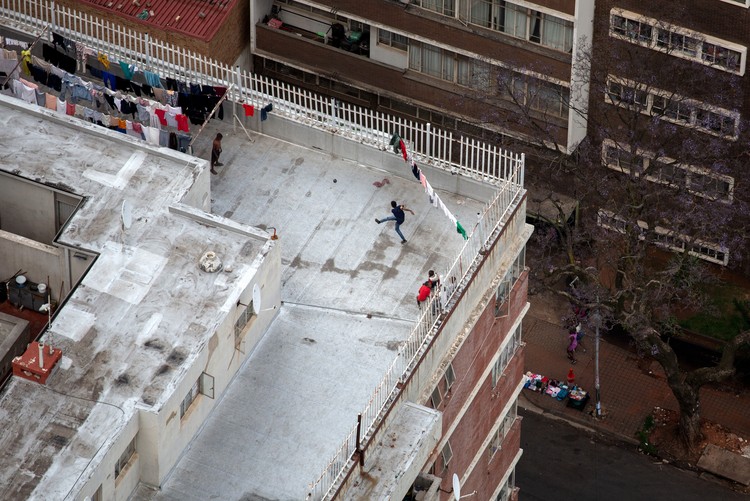
3 November 2025
Children play soccer on a rooftop in Berea, Johannesburg. Photo: James Oatway/Our City News
In the townships of Johannesburg, the sound of children playing soccer is everywhere, in dusty streets, on uneven patches of ground and even in parking lots.
A ball and a scrap of space is enough. But these makeshift pitches often come with danger: traffic, crime, drugs. Safe recreational facilities are still rare in communities where they are most needed.
A new initiative in Johannesburg’s centre is trying to address this. The Field of Dreams is developed by the Maharishi Invincibility Institute (MII) in partnership with Standard Bank, Italtile, BW Cares Foundation and renowned former test cricket captain and cricket administrator Ali Bacher. It marks a new chapter for the inner city.
Recently, the partners hosted a sod-turning ceremony on what will soon become the first full-sized soccer field built in Johannesburg city centre. The field will be visible to nearly a million motorists each day driving on the M1 highway.
CEO of MII Taddy Blecher said: “This is more than just grass, it is a promise to our youth.”
Blecher said the Field of Dreams is part of MII’s broader “Education Town” campus, a hub where thousands of young people from nearby townships and informal settlements come daily to study, learn skills and access career opportunities.
The project has been driven by Bacher, with the support of JoziMyJozi - a coalition focused on transforming the future of the city centre.
Children play at Madala Hostel in Alexandra. Photo: James Oatway/Our City News
While the Field of Dreams is new to the city centre, it builds on a growing movement of community-led initiatives that use sport as a tool for education and upliftment.
One such example is the network of SafeHubs, founded by AMANDLA Social Enterprises in 2007. This is a non-government organisation that provides secure environments where young people can learn, play, and access education and mentorship opportunities.
According to the SafeHub global website, 13 Safe-Hubs in the country are either operational or in development. In Johannesburg, there are three such hubs: in Diepsloot, Alexandra and Jabulani. Each has a high-quality soccer pitch. Young people are welcomed into programmes that include after-school tutoring, digital literacy, job readiness training, and mentorship.
Refiloe Tsiyane, acting facility manager at the Alexandra SafeHub, said SafeHub tries to bridge the gap between physical education and life skills from Early Childhood Development level.
“We also have an ECD [early childhood development] programme that we run. We fetch kids for an hour session once a week… in Alex, most of our ECDs do not have space for them to get up in the class and move around and the teachers are not fully equipped to provide physical education.”
Meanwhile, once-thriving public spaces like Jukskei Park and Joubert Park have fallen into neglect, plagued by crime, vandalism and poor maintenance.
Gugulethu Makhothi, a resident of Eastbank, said her 11-year-old son had been stabbed at Jukskei Park after soccer practice. “Because of the lack of facilities here, his team was training at the park. Last November, a group of older boys attacked him and took his phone. There are many incidents here but the government is not doing anything,” she said.
Joubert Park, Johannesburg’s oldest and most central park, was designed as a green haven for inner-city families. Today, it is a symbol of urban neglect. Its play areas are broken. Walkways are overgrown. Its reputation is marred by crime and drug use. What was meant to be a safe space for recreation has become one that residents avoid.
Despite repeated requests for comment, Johannesburg City Parks and Zoo had not responded to questions about the maintenance and safety of Joubert Park and Jukskei Park by the time of publication.
A child navigates a puddle of sewage water at Madala Hostel in Alexandra. Photo: James Oatway/Our City News